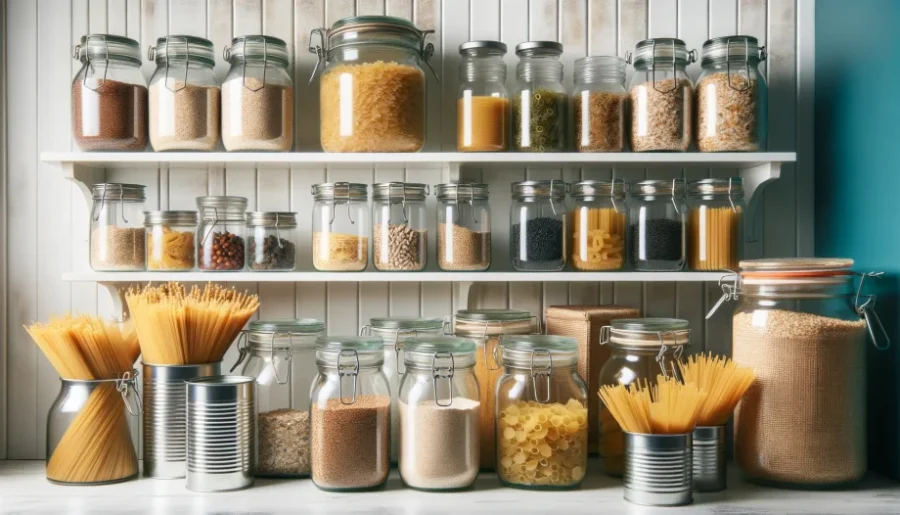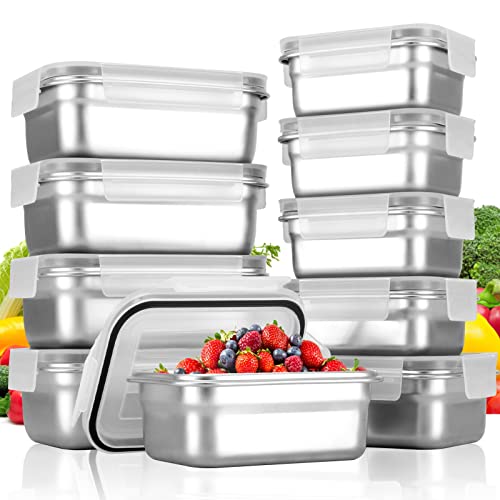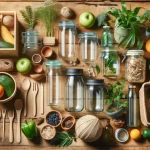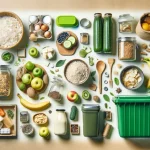
Discover zero-waste kitchen essentials for a sustainable lifestyle! Learn how to reduce waste with reusable containers, compost bins, and more in our friendly guide.
Zero-Waste Kitchen Essentials
Key Takeaways:
- Zero-Waste Kitchen Essentials include reusable containers, glass jars, bamboo dish brushes, cloth produce bags, and a compost bin.
- These items help reduce waste and promote sustainability in the kitchen by replacing disposable products with durable, eco-friendly alternatives.
Are you ready to transform your kitchen into a haven of sustainability?
With zero-waste kitchen essentials, you can easily reduce waste and embrace eco-friendly practices.
From reusable containers to compost bins, join us as we explore simple swaps for a greener, cleaner kitchen.
Zero-Waste Kitchen Essentials
Embracing a zero-waste lifestyle starts in the heart of the home: the kitchen.
By choosing sustainable and reusable alternatives to common kitchen items, you can significantly reduce your environmental footprint.
In this post, we’ll explore the essential items you need to create a zero-waste kitchen.
1. Reusable Containers
Switching to reusable containers is a cornerstone of a zero-waste kitchen.
These eco-friendly alternatives not only reduce reliance on single-use plastics but also help keep your pantry organized and your food fresher for longer.
Here’s a look at some essential reusable containers for your kitchen:
Glass Jars
- Versatility: Ideal for storing dry goods like grains, pasta, and spices, as well as preserving homemade jams and pickles.
- Visibility: Clear glass makes it easy to see contents and monitor quantities.
- Eco-Friendly: Glass is recyclable and doesn’t leach chemicals into food.
Stainless Steel Containers
- Durability: Resistant to rust and corrosion, making them perfect for long-term use.
- Portability: Great for packing lunches or snacks without the risk of breaking.
- Non-Toxic: Stainless steel is free from harmful chemicals found in some plastics.
Silicone Bags
- Flexibility: Soft and pliable, these bags can fit into tight spaces in your fridge or freezer.
- Sealable: Airtight seals keep food fresh and prevent leaks.
- Easy to Clean: Silicone bags can be washed and reused multiple times, reducing waste.
By incorporating these reusable containers into your kitchen, you can take a significant step towards a more sustainable lifestyle, keeping your food fresh and your conscience clear.
2. Composting Solutions
Embracing composting is a natural step in achieving a zero-waste kitchen.
By turning your food scraps into valuable compost, you not only reduce waste but also enrich your garden soil.
Here are some composting solutions that can easily be integrated into your kitchen routine:
Countertop Compost Bin
- Convenience: Keeps your composting efforts within easy reach as you cook and prepare meals.
- Odor Control: Many models come with filters to minimize any unpleasant smells.
- Style: Available in various designs to match your kitchen decor.
Worm Compost Bin
- Efficiency: Worms break down organic matter quickly, producing nutrient-rich compost.
- Educational: A great way to learn about the composting process and natural cycles.
- Space-Saving: Can be set up indoors or outdoors, making it suitable for small spaces.
Implementing these composting solutions in your kitchen is a great way to contribute to a healthier environment while providing your garden with rich, organic matter.
3. Reusable Produce Bags
Ditching plastic produce bags for reusable options is a simple yet impactful way to reduce waste in your kitchen.
Reusable produce bags are not only eco-friendly but also durable and versatile, making them perfect for shopping and storing fresh produce.
Here’s how to make the switch:
Mesh or Cloth Bags
- Breathability: Mesh bags allow your produce to breathe, extending its freshness.
- Versatility: Cloth bags can be used for a variety of items, not just produce.
- Sustainability: Both options are washable and reusable, reducing the need for single-use plastic bags.
DIY Bags
- Personalization: Making your own bags allows you to choose the size and fabric that best suit your needs.
- Upcycling: Repurposing old t-shirts or fabric scraps is a great way to reduce waste and save money.
- Creativity: DIY bags can be customized with different patterns, colors, and designs.
By incorporating reusable produce bags into your shopping routine, you can take a significant step towards a zero-waste kitchen, reducing plastic waste and supporting a healthier environment.
4. Sustainable Cleaning Tools
Transforming your kitchen cleaning routine with sustainable tools is a practical step towards a zero-waste lifestyle.
By opting for eco-friendly materials and reusable options, you can reduce plastic waste and minimize your environmental impact.
Here’s a look at some essential sustainable cleaning tools for your kitchen:
Bamboo Dish Brushes
- Eco-Friendly: Bamboo is a fast-growing, renewable resource that is naturally antibacterial.
- Durable: Bamboo brushes are sturdy and can last longer than plastic ones, reducing the need for frequent replacements.
- Biodegradable: At the end of their life, bamboo brushes can be composted, unlike plastic brushes.
Reusable Dishcloths
- Versatile: Washable dishcloths can be used for cleaning surfaces, drying dishes, and wiping spills.
- Cost-Effective: Reusable cloths save money over time compared to constantly buying paper towels.
- Sustainable: Made from natural fibers like cotton or bamboo, these cloths can be laundered and reused for years.
Natural Cleaning Products
- DIY Solutions: Homemade cleaning solutions with vinegar, baking soda, and lemon are effective, non-toxic, and inexpensive.
- Eco-Friendly Brands: If you prefer ready-made products, choose brands that use natural ingredients and eco-friendly packaging.
- Chemical-Free: Natural cleaning products are safer for your health and the environment, reducing the risk of indoor air pollution.
By incorporating sustainable cleaning tools into your routine, you not only contribute to a cleaner kitchen but also support a healthier planet. Embracing these eco-friendly alternatives is a simple yet impactful way to move towards a more sustainable lifestyle.
5. Reusable Beverage Containers
Transitioning to reusable beverage containers is a simple yet effective way to reduce waste in your kitchen and on the go.
By choosing durable and eco-friendly options, you can avoid single-use plastics and contribute to a more sustainable lifestyle.
Here are some essential reusable beverage containers to consider:
Glass or Stainless Steel Water Bottles
- Eco-Friendly: Both glass and stainless steel are recyclable and free from harmful chemicals found in some plastics.
- Durability: These materials are sturdy and can withstand daily use without leaching or breaking.
- Insulation: Stainless steel bottles often offer insulation to keep your drinks cold or hot for longer periods.
Reusable Coffee Cups
- Convenience: Bring your own cup to your favorite coffee shop to reduce waste from disposable cups.
- Insulation: Many reusable coffee cups are designed to keep your coffee warm while being comfortable to hold.
- Style: Available in various designs and colors, reusable cups can be a fashionable accessory as well as an eco-friendly choice.
By incorporating reusable beverage containers into your daily routine, you not only reduce waste but also enjoy the convenience and style they offer.
Making this small change can have a big impact on the environment and your overall waste reduction efforts.
6. Bulk Shopping Gear
Adopting bulk shopping gear is a game-changer for anyone committed to a zero-waste lifestyle.
By using reusable containers and bags for bulk purchases, you can significantly reduce packaging waste and take control of the quantities you buy.
Here’s a look at some essential gear for bulk shopping:
Bulk Bags
- Fabric Options: Choose from cotton, muslin, or mesh bags, depending on the type of bulk items you’re purchasing.
- Portability: Lightweight and foldable, these bags are easy to carry to the store and back home.
- Versatility: Use them for a variety of bulk goods, including grains, beans, nuts, and even produce.
Spice Jars
- Refillable: Bring your empty spice jars to the store to refill with just the amount you need.
- Organization: Clear glass jars make it easy to see what’s inside and keep your spices organized.
- Sustainability: By refilling jars, you avoid the waste of disposable spice containers.
Equipping your kitchen with bulk shopping gear is a practical step toward reducing waste and embracing a more sustainable way of living.
Not only does it minimize packaging waste, but it also allows you to purchase exactly what you need, reducing food waste and saving money in the long run.
Zero-Waste Kitchen Essentials FAQs
Transitioning to a zero-waste kitchen can raise many questions. Here are some frequently asked questions and answers to help you navigate your journey towards a more sustainable kitchen.
Q: What are some easy swaps for a zero-waste kitchen?
A: Simple swaps include using wooden cooking utensils instead of plastic, switching to glass containers, replacing paper towels with reusable ones, and using beeswax wraps instead of plastic wrap. Sustainable coffee setups, like reusable filters, also make a big difference.
Q: How can I store food without plastic?
A: Opt for glass containers, mason jars, or silicone bags for storing bulk goods and leftovers. Beeswax wraps are great for wrapping food, and cloth napkins can double as dish cloths.
Q: What are some tips for reducing kitchen waste?
A: Start by using cloth napkins instead of paper, storing leftovers in glass containers, and freezing food on the brink of going bad in reusable bags. Eating your leftovers and using glass jars for storage are also key practices.
Q: Are there eco-friendly alternatives to plastic kitchen items?
A: Yes! Consider using coconut bowls, sustainable reusable cutlery, and beeswax wraps as alternatives to plastic items. These not only reduce waste but also add a natural touch to your kitchen.
Q: How can I make my cleaning routine more eco-friendly?
A: Switch to wooden or bamboo toilet brushes, use old-school janitor mops, and opt for a durable vacuum like Dyson Animal. You can also make your own all-natural cleaning products to further reduce waste.
Zero-Waste Kitchen Essentials Conclusion
Embracing a zero-waste kitchen is a journey of mindful consumption and sustainable living.
By choosing reusable alternatives and minimizing waste, we can create a healthier environment and a more sustainable future.
Let’s explore some final thoughts and actions to further this goal:
Reflect on Your Journey
- Celebrate Progress: Acknowledge the positive changes you’ve made in your kitchen and the impact they have on the environment.
- Learn from Challenges: Identify any obstacles you faced and consider ways to overcome them moving forward.
Share Your Experience
- Inspire Others: Share your zero-waste journey with friends, family, and online communities to encourage others to make similar changes.
- Lead by Example: Your actions can inspire those around you to adopt more sustainable practices in their own kitchens.
Continue to Evolve
- Stay Informed: Keep up with the latest zero-waste trends, products, and practices to continually improve your sustainable kitchen.
- Experiment with New Ideas: Try new zero-waste recipes, DIY cleaning products, or innovative reusable items to enhance your eco-friendly kitchen.
Support Sustainable Initiatives
- Advocate for Change: Support policies and initiatives that promote waste reduction and sustainability at the local and national levels.
- Support Eco-Friendly Brands: Choose products from companies that prioritize sustainability and ethical practices.
In conclusion, creating a zero-waste kitchen is a meaningful step towards a more sustainable lifestyle.
Every small change we make adds up to a significant impact on our planet.
By continuing to make conscious choices and embracing new sustainable practices, we can all contribute to a cleaner, greener world.
Learn more: Mastering Zero-Waste Living: 7 Easy Tips and Tricks
Resources for Zero-Waste Kitchen Essentials
Creating a zero-waste kitchen is a crucial step toward sustainability.
To assist you in this journey, here are some authoritative resources from educational institutions that provide valuable insights and tips:
- University of Colorado Boulder – Environmental Center
- Offers practical advice on reducing food waste in the kitchen, such as learning how to compost and being mindful of food consumption.
- Read more
- University of Michigan – Office of Campus Sustainability
- Provides information on how to get compost service in your staff kitchen and resources for creating sustainable kitchens.
- Read more
- Harvard T.H. Chan School of Public Health – The Nutrition Source
- Discusses the benefits of less food waste, such as cost savings, reduced methane emissions, and better resource management. Also proposes solutions to food waste, including reducing food waste through improved methods and recycling food waste for compost or bioenergy.
- Read more
- Harvard Energy & Facilities – Zero Waste
- Highlights the importance of reducing, repurposing, and reusing as critical components of a Zero Waste system. It also emphasizes the need for collaboration across the university to transition to a zero-waste campus.
- Read more
These resources offer a wealth of knowledge to help you make informed decisions and take actionable steps toward creating a zero-waste kitchen.












![WiseLife Reusable Grocery Bags [3 Pack],Large Grocery Tote Bag Water Resistant Shopping Bags Foldable Collapsible Grocery Bag for Clothes,Toys,Shoes and Picnic WiseLife Reusable Grocery Bags [3 Pack],Large Grocery Tote Bag Water Resistant Shopping Bags Foldable Collapsible Grocery Bag for Clothes,Toys,Shoes and Picnic](https://m.media-amazon.com/images/I/617KpQYRqOL._SL500_.jpg)






